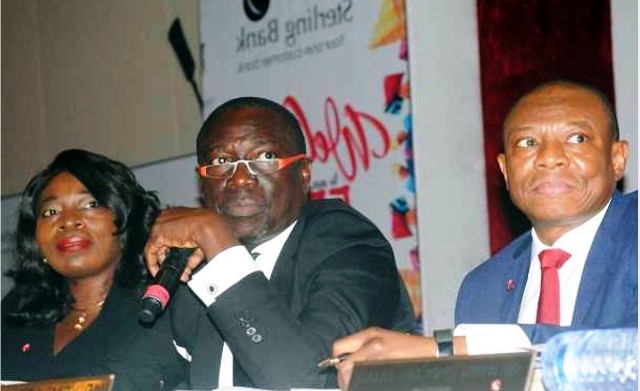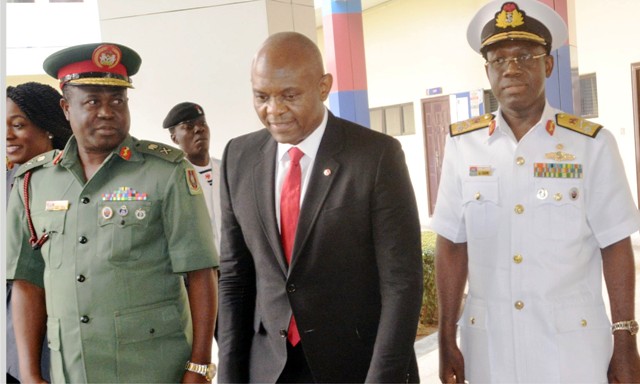Business
Nigeria’s Inflation Drops To 17.24 -NBS

The National Bureau of Statistics (NBS) has stated that the country’s inflation dropped to 17.24 per cent in April on year-on-year basis from 17.26 per cent in March.
The NBS stated in “Consumer Price Index (CPI) April 2017’’ report released in Abuja that the inflation was 0.02 per cent lower than the rate recorded in March.
“This is the third consecutive month of a decline in the headline CPI rate, exhibiting effects of some easing already high food and non-food prices as well as favourable base effects over 2016 prices.
“Increases were recorded in all Classification of Individual Consumption by Purpose (COICOP) divisions that yield the Headline Index.
“The top items to have recorded the highest year- on- year increases across all the divisions were Solid Fuels, Bread and Cereals.
“Meat, Liquid Fuels, Clothing materials, other articles of clothing and clothing accessories, and Fish also recorded increase.’’
On a month-on-month basis, the report stated the Headline index increased by 1.60 per cent in April which was 0.12 per cent points lower than the rate recorded in March.
“On a month-on-month basis, the highest rise in prices was dominated by food items including coffee, tea and cocoa and potatoes.
“Other food items are yam and tubers, bread and cereals, milk cheese and eggs and meat.”
According to the report, the Urban Index rose by 17.62 per cent (year-on-year) in April to 18.27 per cent recorded in March.
It also stated that the Rural index increased by 16.69 per cent in April from 16.47 per cent in March.
On month-on-month basis, it stated that the urban index rose by 1.61 per cent in April from 1.76 per cent recorded in March, while the rural index rose by 1.59 per cent in April from 1.69 per cent in March.
“The corresponding twelve-month year-on-year average percentage change for the urban index increased from 18.79 per cent in March to 18.98 per cent in April.
“However, the corresponding rural index also increased from 16.05 per cent in March to 16.69 per cent in the month.’’
Meanwhile, the report further stated that the Composite Food Index rose by 19.30 per cent in April 2017.
On a month-on-month basis, it stated that the food sub-index increased by 2.04 per cent in April, down by 0.17 per cent points from 2.21 per cent recorded in March.
“The rise in the index was caused by increases in prices of bread, cereals, meat, fish, potatoes, yams and other tubers, coffee, tea and cocoa, milk cheese and eggs and oils and fats.
“The average annual rate of change of the Food sub-index for the 12-month period ending in April 2017 over the previous 12-month average was 17.11 per cent.
“It was 0.51 per cent points from the average annual rate of change recorded in March (16.60) per cent,’’ it stated.
The Tide source gathered that CPI measures the average changeover time in prices of goods and services consumed by people for day-to-day living.
The construction of the CPI combines economic theory, sampling and other statistical techniques using data from other surveys to produce a weighted measure of average price changes in the Nigerian economy.
Business
Insecurity, Poor Power Supply Hamper Business Activities – Survey

Business in Nigeria remain under pressure as a result of insecurity and erratic power supply which continue to stifle productivity in the country.
This is even as new data from the Central Bank of Nigeria (CBN) indicate sustained improvements in economic activity.
This was the response of businesses in the CBN’s October 2025 Business Expectations Survey (BES) and the Purchasing Managers’ Index (PMI) report.
While the PMI showed that economic activity expanded for the 11th consecutive month, the BES revealed that businesses are still grappling with crippling operational constraints that threaten to reverse recent macroeconomic gains.
According to the BES conducted between October 6 and 10, firms identified insecurity (71.8 points) as the most critical challenge affecting operations nationwide. This was closely followed by insufficient power supply (70.9 points), multiple taxation (70.2 points), high interest rates (68.4 points) and financial constraints (65.6 points). Analysts say these constraints underscore the depth of structural weaknesses confronting Nigeria’s private sector.
Despite these challenges, the survey reported a rise in business optimism. The Business Confidence Index increased to 38.5 points in October from 31.5 in September. Firms also projected confidence levels to reach 45.6 points in November, with expectations of further improvement over the next three to six months.
However, sector analysts warn that the optimism remains fragile due to the lack of significant improvements in the operating environment.
The BES further showed a modest rise in capacity utilisation from 60.4% in September to 62.0% in October, suggesting that businesses have yet to deploy their productive capacity amid ongoing disruptions fully.
In contrast to the structural constraints highlighted in the BES, the PMI report indicated strengthening economic momentum. The composite PMI rose to 55.4 points, reflecting expansion across major components such as output, new orders, employment, inventories, and supplier delivery times.
A sectoral breakdown showed that the agriculture sector recorded the most substantial improvement, with its PMI climbing to 57.5 points, marking 15 consecutive months of expansion. The services sector also expanded for the ninth straight month to 55.6 points, while the industry sector rose to 54.2 points, the highest in more than a year.
The CBN attributed the positive trends to improvements in the broader macroeconomic landscape, including declining inflation, which eased from 24.5% in January to 18.0% in September, and the year-to-date appreciation of the naira across both official and parallel markets.
The BES showed that the North-East posted the highest business confidence at 56.1 points, while the South-South recorded the lowest at 23.3 points, a trend linked to declining activity in oil-producing communities.
Business
FG Set To Launch Free National Financial Literacy Training For 100,000 Youths,
The Federal Government will on Tuesday, November 25, officially unveil a strategic programme for a free nationwide training of over 100,000 youth on financial literacy.
The Federal Ministry of Youth Development will launch the programme in collaboration with Investonaire Academy. Tagged, the “Financial Literacy, Investment, and Wealth Creation programme.”
The flagship initiative is designed to equip young Nigerians with essential financial skills, investment knowledge, and digital competencies for sustainable wealth creation.
A statement signed by the Director, Press and Public Relations, Federal Ministry of Youth Development, Omolara Esan, and made available to newsmen, confirmed that the launch of the programme, to be held in Abuja, would promote nationwide participation.
It added that the launch would bring together senior government officials, development partners, private sector leaders, and youth representatives to explore innovative approaches for improving financial capability and strengthening the economic prospects of young Nigerians.
Minister of Youth Development, Comrade Ayodele Olawande, would serve as the chief host, while the Minister of Women Affairs, Hajiya Imaan Sulaiman-Ibrahim, would grace the event as the Special Guest of Honour.
Also expected are representatives of key government institutions and private sector partners, including Dr Enefola Odiba, International Programme Director, Investonaire Academy, and Mr. Bashir Nurmohamed, Chief Executive Officer, Hantec Markets
The statement reads, “A major highlight of the event will be the unveiling of a free national financial literacy training programme targeting over 100,000 youths annually. The programme will be powered by a state-of-the-art Learning Management System (LMS) designed to enhance financial intelligence, investment capacity, and entrepreneurial readiness among Nigerian youth.
Lady Godknows Ogbulu
Business
‘Entrepreneurs, Not Foreign Aid Drive Nigeria’s Growth’

The chairman of the United Bank for Africa, Tony Elumelu, says Nigeria’s economic transformation will be driven by entrepreneurs, not government handouts or foreign assistance.
Elumelu, who spoke at the Grow Nigeria Conference 2.0 and themed ‘Empowering Nigeria’s Entrepreneurs: Building Institutions That Last’, in Lagos, Monday, said the nation’s future is already being shaped by business owners who refuse to settle for mediocrity.
Elumelu, who is also the founder of the Tony Elumelu Foundation, described Nigeria as an entrepreneurial nation but stressed the need to build institutions that can stand the test of time.
“Starting businesses is good. Sustaining them is critical, and that’s how we transform this economy,” he said.
He noted that many promising ideas fail because the systems and support structures necessary for growth are absent.
According to him, Nigeria’s renewal must come from the private sector, backed by strong governance frameworks and proper succession planning.
“Nigeria will not be built by government handouts or foreign aid. Government’s role is critical, but Nigeria will be built by entrepreneurs — by you, building businesses that create jobs, hope, and prosperity from the ground up,” he said.
Elumelu, however, emphasized that entrepreneurs cannot succeed in isolation.
“You need frameworks — clear governance, succession planning, and relentless focus on value. We need the right environment. We need a Nigeria where policies are predictable, infrastructure works, and financing is truly accessible,” he said.
He called for stronger alignment between public and private sector efforts, warning that progress would remain limited if institutions work independently rather than collaboratively.
Elumelu commended the Director-General of the Small and Medium Enterprises Development Agency of Nigeria (SMEDAN), Charles Odii, for ongoing reforms within the agency.
He further lauded President Bola Tinubu for appointing young Nigerians to lead key institutions and for prioritizing youth entrepreneurship.
“Let us cut the bureaucracy. Make finance and opportunity real, not theoretical. Let’s help Nigeria’s entrepreneurs move from surviving to winning.
“Every job we create fights insecurity. Every thriving business increases our tax base and accelerates prosperity for all,” Elumelu added.
-
Sports4 days ago
D’Tigress shift focus to W’Cup qualifiers, After Friendlies
-
Sports4 days ago
Neglect, Mismangement Responsible For 2026 W’Cup Mishap – Barr Green
-
Sports4 days ago
“Rangers No More Chasing NPFL Title Ambition”
-
Ict/Telecom3 days ago
NIGCOMSAT Expands Nigeria’s Digital Broadcast Subsector By 35%
-

 Business4 days ago
Business4 days agoKeyamo Lists Aviation Investment Opportunities For Investors
-
Rivers3 days ago
New Year Festival: Dokubo Urges Citizens’ Reorientation In Cultural Values
-
Politics4 days ago
UK, Switzerland Urge Increased Women’s Rep In Governance
-
Sports4 days ago
Corruption, Impunity Bane Of Nigerian Football – Dalung

